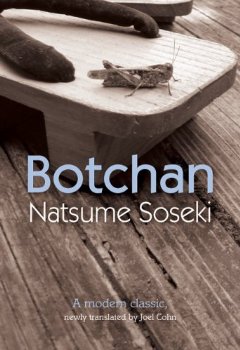Botchan
by Natsume Soseki
A Review by Scott finished Jan. 27, 2010
In one sentence: Botchan is a book for those who find (or found) themselves in a world that they can't entirely understand and that doesn't seem to understand them.
This review will contain spoilers!
In many sentences:
Note: from the introduction we learn that Botchan can mean multiple things: "a younger son; inexperienced or naive; easygoing in a way that can either be mildly endearing or distressingly irresponsible" (5). All of these, we will learn, could be applied to Botchan.
I didn't know what to think of Botchan at first. Here we have this character who is so blunt, so brazen, so unafraid to speak his mind and act in a way that he thought was best that he comes across as rude and uncaring. Yet, at the same time, he speaks with love and adoration for the woman who took care of him after his own mother died. Was I supposed to care for Botchan? Or was I meant to think of him as an odd, brash character who was more interesting than lovable?
In the end, however, I was won over by Botchan's unfailing honesty. I often think of myself as an honest person, but Botchan puts me to shame in this regard. When faced with a situation where he thinks that there is a certain honest, upright path, then there is no doubt in his mind what he should do. The only option is the honest option; nothing else is even considered. It was amazing how refreshing this was. Several times I found myself thinking "you can't possibly say/do that! What will these people think? What about your job?" Ultimately, though, it was the right thing to do, but it takes Botchan's unfailing stubbornness and honesty to actually carry it out and show us that.
Before reading Botchan I saw a quote saying it is the Japanese Catcher in the Rye, and in many ways this comparison is valid. While it has been years since I've read Catcher, Botchan's discussions of those around him, and his descriptions of them being losers, or weaklings is very reminiscent of Holden's claims of others being phonies. For both, this is just a way to say that they are dishonest, manipulative people who are so concerned with their place in the world that they treat those around them with disrespect.
I may not be the angst ridden teenager that I was when I was first captivated by Holden ten years ago, but there's a certain place in my heart that still connects with the guy who no one else seems to understand. In this regard, Botchan is wonderful because it shows that every culture is plagued by these same problems. Furthermore, it is like a sequel to Catcher (granted, it was written first, but I read it second, so bear with me) but not in a fake, forced way, or in a way that ruins the characters of the original. Most true sequels can't accomplish this, so Botchan is almost the perfect accidental sequel to Catcher.
The fact that Botchan is so casual about Kiyo's death is interesting. Clearly this woman was important to him (considering she was the only person in Tokyo he contacted while teaching and that he returned to live with her after leaving the school) and yet he mentions her death as though it is just an afterthought: ""¦but this February the poor woman caught pneumonia and died" (172). He does go on to say she is buried in his families Temple, but that is it - just a few sentences about the woman who was ostensibly the most important person in his life. I wonder how much of the story was meant for her. She had asked him to write a letter telling her everything that had happened during his time as a teacher, but he could never bring himself to do it. Perhaps this was his attempt to make up for that oversight? If so, the dismissal of her death would make sense because it was the one thing that was hardest for him to discuss, and thus the one thing he would want to spend as little time writing about as possible.
My enjoyment of Botchan may not have been immediate, but by the end I was enthralled with this well-realized character who I could appreciate on many levels. I would recommend this without hesitation to anyone who enjoys fiction, but in particular to those who still feel an affinity to Holden Caulfield. It is a book for those who find (or found) themselves in a world that they can't entirely understand and that doesn't seem to understand them. It is familiar and intimate to readers like that. I can understand why both Japanese and American readers alike have found it so appealing for the last 100 years.
Favorite Quote
"Now that I thought about it, though, I realized that most people actually encourage you to turn bad. They seem to think that if you don't you'll never get anywhere in the world. And then on those rare occasions when they encounter somebody who's honest and pure-hearted, they look down on him and say he's nothing but a kid, a Botchan. If that's the way it is, it would be better if they didn't have those ethics classes in elementary school and middle school where the teacher is always telling you to be honest and not to lie. The schools might as well just go ahead and teach you how to tell lies, how to mistrust everybody, and how to take advantage of people. Wouldn't their students, and the world at large, be better off that way?"
First Line
"From the time I was a boy the reckless streak that runs in my family has brought me nothing but trouble."
Last Line
Botchan
by Natsume Soseki
 Original Publication
Original Publication
Jan. 1, 1906
Paperback edition
March 16, 2007
172 pages